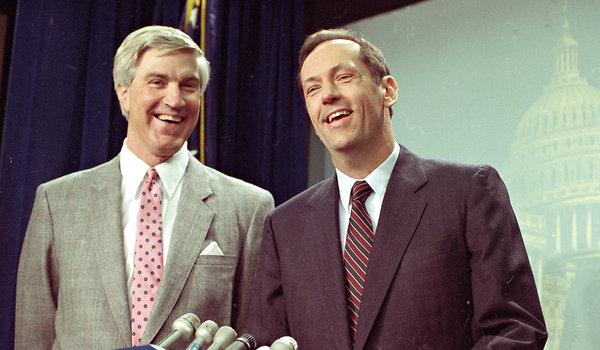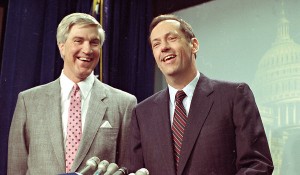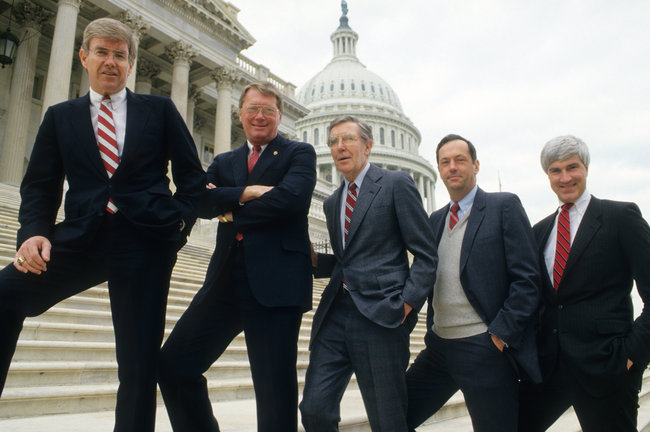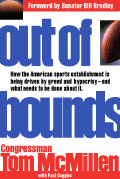Washington Politicians Who Know How to Play Ball

Tom McMillen, left, and Bill Bradley had long careers in Washington after their N.B.A. playing careers. “We had a jock caucus then,” McMillen joked.
by Hillel Kuttler

Tom McMillen, left, and Bill Bradley had long careers in Washington after their N.B.A. playing careers. “We had a jock caucus then,” McMillen joked.
BALTIMORE — One very tall man in Maryland knows something about competing hard until the game ends. That man, Tom McMillen, had this advice for candidates in the elections Tuesday: shake every hand.
His campaigning until the polls closed in 1986 may have made the difference in his successful race to represent Maryland’s Fourth Congressional District in the House of Representatives, McMillen, a former N.B.A. player, said over the weekend. Only after absentee ballots were counted during the next week was McMillen declared the winner, by about 400 votes.
“I stayed until 8 at night working at the precinct to get the last vote,” he said. “That’s a very, very important lesson. You don’t stop until the game is over.”
A 6-foot-11 forward and center for the Knicks, the Buffalo Braves, the Atlanta Hawks and the Washington Bullets before entering politics, McMillen, a Democrat, served three terms in the House in an era that was more bipartisan than now.
His colleagues in the House included the Hall of Fame pitcher Jim Bunning, a Republican from Kentucky who later served in the United States Senate; the professional quarterback Jack Kemp, a Republican from New York; Morris Udall, a Democrat from Arizona who played for the original Denver Nuggets in the National Basketball League, a precursor to the N.B.A.; and Ben Nighthorse Campbell of Colorado, a judoka who competed in the 1964 Olympics. Like Bunning, Campbell later served in the Senate, switching party affiliations from Democratic to Republican along the way. Bill Bradley, the Princeton and Knicks star, was then serving in the Senate as a Democrat from New Jersey.
Bradley, Kemp and Udall unsuccessfully sought the presidency, and Kemp ran as the vice-presidential candidate when Bob Dole led the Republican ticket in 1996 and lost to President Bill Clinton.
“We had a jock caucus then,” McMillen joked. “It was a real proliferation.”
The Capitol’s athletic ranks have since thinned, but this Election Day had the potential to usher in a supply of reserves.
Two pro athletes hold seats in Congress: Representative Jon Runyan, Republican of New Jersey, who was an offensive lineman for 14 years in the N.F.L., mostly with the Philadelphia Eagles, and Representative Heath Shuler, Democrat of North Carolina, the third overall pick in the 1994 draft, whose forgettable career as a quarterback started with the Redskins.
Shuler is preparing to depart Washington. Elected to the House in 2006, he is not running for re-election after the realignment of his 11th District, in western North Carolina. Earlier this year, he declined, too, to enter the race for the state’s open seat for governor.
Runyan, a member of the House who represents the Third District, defeated Shelly Adler, a democrat, in a tight race on Tuesday to secure a second term. Adler was pursuing a seat once held by her husband, John H. Adler, who died last year.
A former N.F.L. player running for the House was Jimmy Farris, Democrat of Idaho, who was a wide receiver for the Redskins and several other teams. And at least two first-time House candidates played collegiate basketball: Danny Tarkanian, a Republican from Nevada who is the son of Jerry Tarkanian and played at Nevada-Las Vegas; and Al Lawson, a Democrat from Florida, who played at Florida A&M.
None, of course, possess the star quality of recent House members like the Hall of Fame wide receiver Steve Largent, Republican of Oklahoma, and Tom Osborne, Republican of Nebraska and a former football coach of the Nebraska Cornhuskers. J. C. Watts, a Republican from Oklahoma and a quarterback for the Oklahoma Sooners, overlapped part of the period during which Largent and Osborne served.
Two athletes who began serving in the House in the 1960s were the Olympic decathlon champion Bob Mathias, a Republican from California, and Wilmer Mizell, a Republican from North Carolina and a pitcher, better known as Vinegar Bend Mizell, whose experiences on the 1960 World Series champion Pittsburgh Pirates and the hapless 1962 Mets doubtless provided an apt introduction to the ups and downs of political life.
But name recognition takes an athlete only so far in Washington, with reputation hardly assuring officeholders of substance, accomplishment or even likability.
Bradley and Kemp are two who did particularly well, making their marks with a mastery of tax policy, said Norman Ornstein, an American Enterprise Institute analyst who specializes in Congress.
Among athletes who served in Congress, those two belong in Washington’s superstar category, Ornstein said. The rest, in his opinion, are a mixed bag.
“Celebrity is an advantage: It gives you a leg up, but you have to be careful about it,” Ornstein said. If exploited to the detriment of veteran colleagues more steeped in policy but less blessed by name, “it could destroy your career before it begins,” he said.

Former professional athletes who were members of Congress in 1987 included, from left, Jack Kemp, Jim Bunning, Morris Udall, Bill Bradley and Tom McMillen. Sports Illustrated/Getty Images
Several athletes who turned to politics said that key values straddled the two worlds, notably team play, perseverance, balancing confidence in one’s ability with respect for the opponent and coping under pressure.
Meanwhile, politics occasionally delivers its own curveballs. Because of the impact from Hurricane Sandy, nearly all events relating to Runyan’s re-election bid were canceled so he could tend to the pressing needs of constituents reeling from the storm, especially those living near the Atlantic Ocean.
“Duty calls, and you have to make sure that everybody has what they need,” Runyan said Sunday. Predictions about Tuesday’s election outcome became an “an unknown,” he added.
As for how to spend Election Day while waiting for the results, Largent said he used to golf, and Runyan planned to clean his home and eat a quiet dinner before addressing the matter at hand. Lawson said he would “be on the corner, waving signs” and urging people to vote until the polls close.
“Believe me, I’ve given everything,” said Lawson, who has served 28 years in the Florida Legislature. “Coming in second is not an option. The aim is to win.”
Tarkanian, for one, hoped for a victory after defeats in previous races. Heading into Election Day, he was prepared either way.
“My dad always taught me: you win with class, and you lose with dignity,” Tarkanian said.
But even while elections, like games, seem to promise definitive outcomes, that is not always so — at least not immediately. That makes election nights unpredictable at times, as McMillen can attest.
When polling stations closed and the tallies were announced that night in November 1986, McMillen led by about 1,200 votes. He knew that the absentee ballots would probably narrow his lead, and they nearly erased it.
Twelve years earlier, McMillen’s University of Maryland team lost the Atlantic Coast Conference championship game by 3 points in overtime to the eventual N.C.A.A. champion, North Carolina State. And at the 1972 Summer Olympics, he was on the court when the Soviet Union ran off with a disputed 1-point win and the gold medal against the United States — in a game “that’s still not over yet,” said McMillen, who now runs a real estate company.
“Forty years later,” he said, “it’s still being prosecuted in the court of public opinion.”








